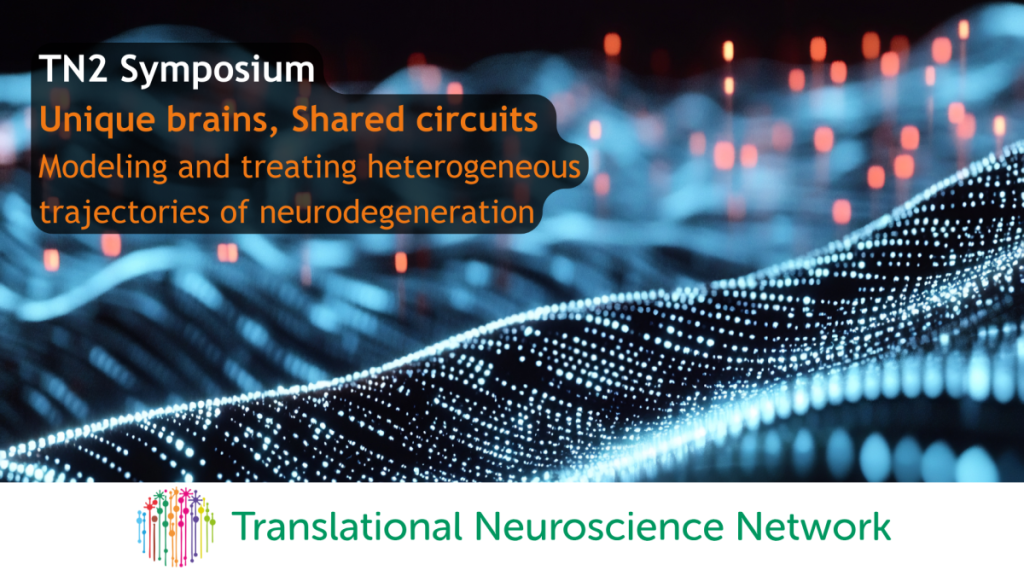| Date: | 27 June 2025 |
| Time: | 10:20 – 12:30 (CEST) |
| Location: | Amsterdam UMC (location VUmc), RDC – Adore, Van der Boechorststraat 6b, Amsterdam |
Share this
Join us on June 27 an engaging event at the crossroads of brain imaging, computational neuroscience, and clinical innovation.
Professor Srikantan Nagarajan will present his translational research using MEG, EEG, and fMRI to investigate brain plasticity and develop diagnostic tools for neurological disorders, including Alzheimer’s disease and other dementias. Neurologist Willem de Haan will discuss network disruptions in Alzheimer’s and how computational modeling and brain stimulation may help personalize treatment and slow disease progression. PhD candidate Tasha Ibrahim will discuss human iSPC-cell cultures to gain a deeper understanding of early network dysfunction in Alzheimer’s disease. And together, all speakers will end the TN2 event with a panel discussion on neurophysiology across scales in neurodegeneration and beyond.
Program
| 10:20 – 10:40 Walk-in |
| 10:40 – 10:45 Welcome & Opening by TN2 team |
| 10:45 – 11:20 Keynote lecture by Prof. Srikantan Nagarajan – Electrophysiological Imaging in Dementias |
| 11:20 – 11:40 Presentation by Dr. Willem de Haan |
| 11:40 – 12:00 Presentation by PhD candidate Tasha Ibrahim |
| 12:00 – 12:15 Panel discussion with all speakers |
| 12:15 – 12:20 Wrap up (Take away lunch available) |
Speakers

Srikantan Nagarajan
University of California, San Francisco
Short Abstract
Srikantan Nagarajan is a Professor of Radiology and Biomedical Imaging at UCSF, with joint appointments in Bioengineering and Therapeutic Sciences and Otolaryngology, Head and Neck Surgery. He directs the Biomagnetic Imaging Laboratory and is actively involved in the UCB-UCSF Joint Graduate Program in Bioengineering. With expertise in biomedical engineering and integrative neuroscience, his research focuses on brain plasticity, speech motor control, and the development of multimodal brain imaging and brain-computer interfaces for diagnosing and assessing various conditions. His translational research spans Autism, Dementia, Tinnitus, Brain Tumors, Epilepsy, TBI, Schizophrenia, Stroke, and Voice Disorders. Prof. Nagarajan has led numerous NIH and NSF-funded projects and authored over 200 peer-reviewed publications, conference papers, and book chapters.

Willem de Haan
Amsterdam UMC
Short Abstract
Willem de Haan is a neurologist and researcher at Amsterdam UMC. The aim of his research is to better understand the relation between brain network activity and cognitive impairment. Having been among the first to describe specific patterns of brain network damage in Alzheimer’s disease (AD), during the past years Dr. de Haan and his team have developed a computational brain network model of AD. This approach helps to understand both the neurophysiological mechanism of the disease, and a recent insight is that it can also guide treatment selection by solving how to modulate abnormal brain activity in order to optimize network function. Modeling predictions are tested in Alzheimer patients using non-invasive brain stimulation.

Tasha Ibrahim
Center for Neurogenomics & Cognitive Research, VU Amsterdam
Short Abstract
Tasha Ibrahim is a PhD candidate specializing in Molecular and Cellular Neurobiology at the Center for Neurogenomics & Cognitive Research (CNCR), Vrije Universiteit Amsterdam. Her research is affiliated with Amsterdam Neuroscience, focusing on neurodegeneration within the Faculty of Science. Ibrahim’s academic background includes studies at UCLouvain (Université catholique de Louvain), further supporting her expertise in the neurosciences. Her work aims to advance understanding of the molecular mechanisms underlying neurodegenerative diseases, contributing to the broader field of neuroscience through both experimental research and scientific collaboration.
Contact
Questions regarding this TN2 symposium? Contact the Amsterdam Neuroscience team.
